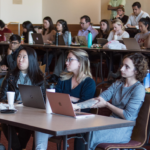Fighting On: Institutional Context
Even without legal status, by acting collectively as a union, graduate student workers won greater structural agency. And barely a year later, union struggles have intensified at every major private university across the nation: Columbia (still!), Harvard, Stanford, Yale, the University of Chicago, Cornell, Duke, the University of Pennsylvania, along with many others – including USC. Every one of the aforementioned institutions has been caught acting in ways ranging from unethical to illegal, a trend that has been roundly condemned by scholarly associations. These universities burn through millions in legal fees in order to challenge election results in court, buying time as they hold out hope that the Trump Administration’s conservative National Labor Relations Board (NLRB) appointees will eventually come to management’s rescue. Setting aside the realization that our progressive-posturing, democracy-and-diversity-loving institutions are collaborating with the Trump Administration at the expense of their students – and given what we already know about the false educational and financial threats posed by graduate student workers – the question remains: Why? Why would USC waste resources upholding anti-democratic values that betray their own civic mission when the hypothetical losses that supposedly made them necessary are unfounded? At some point, it becomes unrealistic to see the arrangement as being about anything besides power and control.
We already know that USC harbors hostility toward unions on par with its elite institutional peers because we are not the first employees to attempt unionizing here. Last year, USC’s non-tenure-track faculty in Dornsife tried to hold an election that was thwarted by the efforts of Provost Michael Quick to sabotage the vote by violating federal labor law. In the Los Angeles Times coverage of the NLRB investigation, it was reported: “USC undermined the possibility of a free and fair election by giving raises to some non-tenure-track faculty at the Dornsife College of Letters, Arts and Sciences just before the vote in January [2016]. University officials also threatened that faculty members would not be welcome on the Academic Senate or other university committees if they voted to form a union.” This hostility is not new. Since the ‘90s, USC has fought bitterly against its janitorial, housing and hospital workers, respectively, when they sought a measure of dignity and security as employees by unionizing. More recently, in just the last few months of 2017, the administration has become aware that its clerical workers are trying to unionize and sent a menacing letter to them intended by provoke fear by deploying vague misinformation in threatening overtones.



